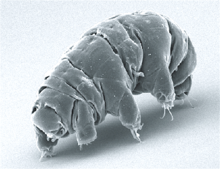Milnesium is a genus of tardigrades.[1] It is rather common, being found in a wide variety of habitats across the world.[2] It has a fossil record extending back to the Cretaceous, the oldest species found so far (M. swolenskyi) is known from Turonian stage deposits on the east coast of the United States.[3] Milnesiums are one of the most desiccation and radiation-resistant invertebrates on Earth because of their unique ability to transform into a "tun" state and utilize intrinsically disordered proteins when experiencing extreme environments.[4]
| Milnesium Temporal range:
| |
|---|---|

| |
| SEM image of Milnesium tardigradum | |
| Scientific classification | |
| Domain: | Eukaryota |
| Kingdom: | Animalia |
| Phylum: | Tardigrada |
| Class: | Eutardigrada |
| Order: | Apochela |
| Family: | Milnesiidae |
| Genus: | Milnesium Doyère, 1840 [1] |
Species
editDescribed species include:[5]
- Milnesium alabamae Wallendorf & Miller, 2009[6]
- Milnesium almatyense Tumanov, 2006
- Milnesium alpigenum Ehrenberg, 1853
- Milnesium antarcticum Tumanov, 2006
- Milnesium argentinum Roszkowska, Ostrowska & Kaczmarek, 2015
- Milnesium asiaticum Tumanov, 2006
- Milnesium barbadosense Meyer & Hinton, 2012
- Milnesium beasleyi Kaczmarek, Jakubowska & Michalczyk, 2012
- Milnesium beatae Roszkowska, Ostrowska & Kaczmarek, 2015
- Milnesium berladnicorum Ciobanu, Zawierucha, Moglan & Kaczmarek, 2014[7]
- Milnesium bohleberi Bartels, Nelson, Kaczmarek & Michalczyk, 2014[8]
- Milnesium brachyungue Binda & Pilato, 1990
- Milnesium cassandrae Moreno-Talamantes, Roszkowska, García-Aranda, Flores-Maldonado & Kaczmarek, 2019
- Milnesium burgessi Schlabach, Donaldson, Hobelman, Miller & Lowman, 2018
- Milnesium dornensis Ciobanu, Roszkowska & Kaczmarek, 2015
- Milnesium dujiangensis Yang, 2003
- Milnesium eurystomum Maucci, 1991
- Milnesium fridae Moreno-Talamantes, León-Espinosa, García-Aranda, Flores-Maldonado & Kaczmarek, 2020
- Milnesium granulatum Ramazzotti, 1962
- Milnesium jacobi Meyer & Hinton, 2010[9]
- Milnesium katarzynae Kaczmarek, Michalczyk & Beasley, 2004
- Milnesium kogui Londoño, Daza, Caicedo, Quiroga & Kaczmarek, 2015
- Milnesium krzysztofi Kaczmarek & Michalczyk, 2007
- Milnesium lagniappe Meyer, Hinton & Dupré, 2013
- Milnesium longiungue Tumanov, 2006
- Milnesium minutum Pilato & Lisi, 2016
- Milnesium quadrifidum Nederström, 1919
- Milnesium rastrum Suzuki, Sugiura, Tsujimoto, and McInnes, 2023[10]
- Milnesium reductum Tumanov, 2006
- Milnesium reticulatum Pilato, Binda & Lisi, 2002
- Milnesium sandrae Pilato & Lisi, 2016
- Milnesium shilohae Meyer, 2015
- Milnesium swansoni Young, Chappell, Miller & Lowman, 2016[11]
- † Milnesium swolenskyi Bertolani & Grimaldi, 2000
- Milnesium tardigradum Doyère, 1840
- Milnesium tetralamellatum Pilato & Binda, 1991
- Milnesium tumanovi Pilato, Sabella & Lisi, 2016
- Milnesium validum Pilato, Sabella, D'Urso & Lisi, 2017
- Milnesium variefidum Morek, Gąsiorek, Stec, Blagden & Michalczyk, 2016
- Milnesium vorax Pilato, Sabella & Lisi, 2016
- Milnesium zsalakoae Meyer & Hinton, 2010[9]
References
edit- ^ a b "ITIS standard report: Milnesium (Doyère, 1840)". Integrated Taxonomic Information System. Retrieved 14 February 2013.
- ^ "Nelson, Diane (2002). "Current Status of the Tardigrada: Evolution and Ecology". Integr. Comp. Biol. (42): 652–659".
{{cite web}}: Missing or empty|url=(help) - ^ "Milnesium Doyere 1840 (water bear)". PBDB.
- ^ Boothby, Thomas C.; Tapia, Hugo; Brozena, Alexandra H.; Piszkiewicz, Samantha; Smith, Austin E.; Giovannini, Ilaria; Rebecchi, Lorena; Pielak, Gary J.; Koshland, Doug; Goldstein, Bob (2017-03-16). "Tardigrades Use Intrinsically Disordered Proteins to Survive Desiccation". Molecular Cell. 65 (6): 975–984.e5. doi:10.1016/j.molcel.2017.02.018. ISSN 1097-2765. PMC 5987194. PMID 28306513.
- ^ Degma, Peter; Bertolani, Roberto; Guidetti, Roberto (30 June 2018). Actual checklist of Tardigrada species (2009-2018) (PDF). 34th Ed. University of Modena and Reggio Emilia. Retrieved 15 December 2018.
- ^ Wallendorf, Mark; Miller, William R. (2009). "Tardigrades of North America: Milnesium alabamae nov. sp. (Eutardigrada: Apochela: Milnesiidae) a new species from Alabama". Transactions of the Kansas Academy of Science. 112 (3–4): 181–186. doi:10.1660/062.112.0404. ISSN 0022-8443. S2CID 84216471.
- ^ Ciobanu, Daniel; Zawierucha, Krzysztof; Moglan, Ioan; Kaczmarek, Łukasz (2014). "Milnesium berladnicorum sp. n. (Eutardigrada, Apochela, Milnesiidae), a new species of water bear from Romania". ZooKeys (429): 1–11. doi:10.3897/zookeys.429.7755. ISSN 1313-2970. PMC 4137295. PMID 25147467.
- ^ Bartels, Paul J.; Nelson, Diane R.; Kaczmarek, Łukasz; Michalczyk, Łukasz (2014). "The genus Milnesium (Tardigrada: Eutardigrada: Milnesiidae) in the Great Smoky Mountains National Park (North Carolina and Tennessee, USA), with the description of Milnesium bohleberi sp. nov". Zootaxa. 3826 (2): 356–68. doi:10.11646/zootaxa.3826.2.5. ISSN 1175-5334. PMID 24990052.
- ^ a b Meyer, Harry A.; Hinton, Juliana G. (2010). "Milnesium zsalakoae and M. jacobi, two new species of Tardigrada (Eutardigrada: Apochela: Milnesiidae) from the southwestern United States". Proceedings of the Biological Society of Washington. 123 (2): 113–120. doi:10.2988/09-29.1. ISSN 0006-324X. S2CID 84449596.
- ^ Suzuki, Atsushi C.; Sugiura, Kenta; Tsujimoto, Megumu; McInnes, Sandra J. (2023). "A New Species of Bisexual Milnesium (Eutardigrada: Apochela) Having Aberrant Claws from Innhovde, Dronning Maud Land, East Antarctica". Zoological Science. 40 (3). doi:10.2108/zs220085.
- ^ Young A, Chappell B, Miller W, Lowman M (2016). "Tardigrades of the Tree Canopy: Milnesium swansoni sp. nov. (Eutardigrada: Apochela: Milnesiidae) a new species from Kansas, U.S.A." Zootaxa. 4072 (5): 559–568. doi:10.11646/zootaxa.4072.5.3. PMID 27395945.